MICHIGAN COUNTRY LINES



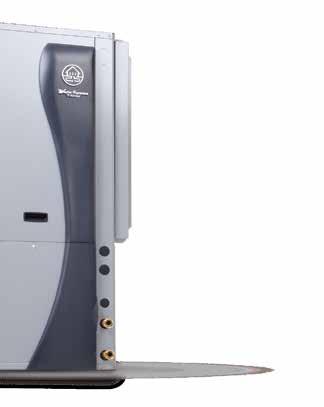





You may not realize it, but you’re sitting on a free and renewable supply of energy. A WaterFurnace geothermal comfort system taps into the stored solar energy in your own backyard to provide savings of up to 70% on heating, cooling, and hot water with a comfort you have to experience to believe. Contact your local WaterFurnace dealer today to learn more about how geothermal can be a game changer for your home.
YOUR LOCAL WATERFURNACE DEALERS
Allendale Allendale Htg & Clg (800) 327-1937 allendaleheating.com
Berrien Springs WaterFurnace Michiana (269) 473-5667 gogreenmichgeo thermal.com
Big Rapids Stratz Htg & Clg, Inc. (231) 796-3717 stratzgeocomfort.com
Filion/Bad Axe
Air-O-Dynamic Htg & Clg (989) 582-0137 aod-hvac.com
Grand Rapids
Bel Aire Htg & Clg
1-888-235-2473 belaire.com
Hart Adams Htg & Clg (231) 873-2665 adamsgeothermal-mi.com
Holland G.H.P. Systems Inc. (616) 396-5833 ghpsystems-inc.com
Indian River M&M Plmb & Htg (231) 238-7201 mm-plumbing.com
Lansing
Candor Mechanical (517) 920-0890 candormechanical.com
Michigan Center Comfort 1/Air Serv of Southern Michigan (517) 764-1500 airserv.com/southernmichigan/
Mt Pleasant
Walton Htg & Clg (989) 772-4822 waltonheating.com
Portage
Bel Aire Htg & Clg 1-888-235-2473 belaire.com
Portland ESI Htg & Clg (517) 647-6906 esiheating.com
Sunfield
Mark Woodman Plmb & Htg (517) 886-1138 mwphonline.com
Three Rivers
Bel Aire Htg & Clg 1-888-235-2473 belaire.com
Traverse City
Geofurnace Htg & Clg (231) 943-1000 geofurnace.com
CO-OP REBATE INCENTIVES
Alger Delta Electric: up to $2,000
Cherryland Electric: up to $2,500
Cloverland: up to $6,275
Great Lakes Energy: up to $5,000
Homeworks/Tri-County Electric: up to $4,750
Presque Isle Electric & Gas Co-op: up to $4,750
Thumb Electric: up to $2,000


EXECUTIVE EDITOR: Casey Clark
EDITOR: Christine Dorr
GRAPHIC DESIGNER: Karreen Bird
RECIPE EDITOR: Christin Russman
COPY EDITOR: Yvette Pecha
CONTRIBUTING EDITOR: Emily Haines Lloyd
PUBLISHER: Michigan Electric Cooperative Association
Michigan Country Lines, USPS591-710, is published monthly, except August and December, with periodicals postage paid at Lansing, Mich., and additional offices. It is the official publication of the Michigan Electric Cooperative Association, 201 Townsend St., Suite 900, Lansing, MI 48933.
Subscriptions are authorized for members of Alger Delta, Cherryland, Great Lakes, HomeWorks Tri-County, Midwest Energy & Communications, Ontonagon, Presque Isle, and Thumb electric cooperatives by their boards of directors.
POSTMASTER:
Send all UAA to CFS.
ASSOCIATION OFFICERS: Chris O’Neill, HomeWorks TriCounty Cooperative, chairman; Gabe Schneider, Cherryland Electric Cooperative, vice chairman; Shaun Lamp, Great Lakes Energy Cooperative, secretary-treasurer; John Kran, president and CEO.
CONTACT US/LETTERS TO EDITOR: Michigan Country Lines 201 Townsend St., Suite 900 Lansing, MI 48933 248-534-7358 editor@countrylines.com
CHANGE OF ADDRESS: Please notify your electric cooperative. See page 4 for contact information.
The appearance of advertising does not constitute an endorsement of the products or services advertised.
MICHIGAN’S ELECTRIC COOPERATIVES
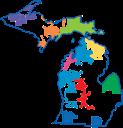
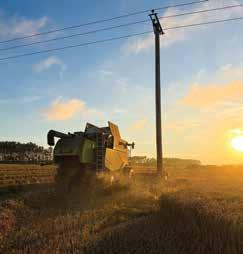


RECIPE CONTEST
See details on page 10. Cozy Bowls, due Nov. 1. Win a $100 bill credit!
GUEST COLUMN
See details on page 18. Share your fondest memories and stories. Win $200 for stories published!
To enter contests, submit reader content & more, visit countrylines.com/community
6 POWER OF CO-OP COMMUNITIES
From the REA to today—the enduring power of connection.
10 MI CO-OP KITCHEN
Fall Favorites: From harvest to home— recipes to fall for.
14 ADAM NIGHTINGALE: SMALL TOWN ROOTS, SPARTAN GLORY
How small-town values shaped a championship culture at Michigan State.
18 GUEST COLUMN
The Best Garage Sale Find: A 1940 Dodge and a lifetime of memories.
Portland office/Mail payments to:
7973 E. Grand River Ave.
Portland, MI 48875
Open 8 a.m.–5 p.m. Monday–Friday Blanchard office:
3681 Costabella Ave.
Blanchard, MI 49310
Open 8 a.m.–5 p.m. Monday–Friday Night deposit box available at both locations.
Electric bill/account questions: 517-647-7554 or 1-800-562-8232
Pay by phone, anytime: 1-844-963-2875
Service questions/outages: 517-647-7554 or 1-800-848-9333 (24 hours for emergency calls)
Tri-County Propane: 1-877-574-2740
HomeWorks Connect 1-800-668-8413
BOARD OF DIRECTORS
District 1 — John Lord, Vice-Chairman 2276 Plains Rd., Leslie, MI 49251 517-974-2518 • jlord@homeworks.org
District 2 — Jim Stebbins 7139 Peddler Lake Rd., Clarksville, MI 48815 517-930-8132 • jstebbins@homeworks.org
District 3 — Luke Pohl, Chairman 15560 W. Hanses Rd., Westphalia, MI 48894 989-292-0427 • lpohl@homeworks.org
District 4 — Jake Borton
7543 E. Edgar Rd., Vestaburg, MI 48891 989-506-3404 • jborton@homeworks.org
District 5 — Theresa Sopocy 6996 E. Wilson Rd., Bannister, MI 48807 989-292-0295 • tsopocy@homeworks.org
District 6 — Dave Livermore
8060 W. Airline Rd., Weidman, MI 48893 989-289-3019 • dlivermore@homeworks.org
District 7 — Shirley Sprague, Secretary-Treasurer 15563 45th Ave., Barryton, MI 49305 989-382-7535 • ssprague@homeworks.org
Editor: Charly Markwart, CCC cmarkwart@homeworks.org
By Chris O’Neill, President/CEO

As HomeWorks’ CEO, I am grateful and proud to lead a not-for-profit electric cooperative that is owned by the members we serve and dedicated solely to serving the needs of our local rural communities.
Cooperatives are a unique business model dating back to 19th-century Britain. Co-ops are typically formed when individuals come together to solve a shared problem through collaborative action, like when farmers in Eaton, Ingham, and Jackson counties joined to form Tri-County Electric Cooperative in 1937 to serve their need for electricity on their farms. You might not realize that your local credit unions are cooperatives, as are several nationally recognized businesses such as Sunkist, Ocean Spray, Land O’Lakes, Sunbeam Bread, Ace Hardware, and Associated Press News.
More than 900 electric cooperatives serve over 20 million homes and businesses across rural America. Like the well-known co-ops mentioned above, we are all linked together by the Seven Cooperative Principles. October is National Co-op Month, so I thought this would be a good time to highlight these important principles that guide us in every decision we make and everything we do every day to serve you.
Voluntary and Open Membership: Cooperatives are voluntary organizations, open to all persons able to use their services and willing to accept the responsibilities of membership, without gender, social, racial, political, or religious discrimination.
Democratic Member Control: Cooperatives are democratic organizations controlled by their members, who actively set policies and make decisions. The elected representatives are accountable to the membership. In primary cooperatives like HomeWorks, members have equal voting rights; every member has a voice and a vote!
Members’ Economic Participation: Members contribute equitably to and democratically control the capital of their cooperative.
Autonomy and Independence: Cooperatives are autonomous, self-help organizations controlled by their members. If they enter into agreements with other organizations, including governments, or raise capital from external sources, they do so on terms that ensure democratic control by their members and maintain their cooperative autonomy.
Education, Training, and Information: Cooperatives provide education and training for their members, elected representatives, managers, and employees to contribute effectively to the development of their organizations. They also inform the general public about the nature and benefits of cooperation.
Cooperation Among Cooperatives: Cooperatives serve their members most effectively and strengthen the cooperative movement by working together through local, national, regional, and international structures, like the Michigan Electric Cooperative Association and the National Rural Electric Cooperative Association.
Concern for Community: While focusing on member needs, cooperatives work for the sustainable development of their communities through policies and programs accepted by their members.
Unfortunately, the past five years have been a period of exploding costs for the electric utility industry and for broadband providers, pushed by soaring demand, supply chain challenges, raw materials shortages, increased labor costs, and tari s. The impact has been rapid increases in the cost of producing power, longer and more unpredictable project timelines, and the need for more financing, all of which have a ected electric rates for residences, businesses, and other end-users across the country. Here’s a look at what’s contributing to the trend. Percent increase since 2020: Sources:
Utility poles (wood, steel, composite)
Crossarms & braces (steel/wood).......
Conductor wire (aluminum/copper)..
Transformers
Grain-oriented electrical steel............
Oil/dielectric fluids..............................
Copper wiring......................................
Concrete
Smart meters.......................................
Pad-mounted switchgear
Circuit breakers/reclosers...................
+25–40%
+20–35%
+30–50%
+70–100%
+80–100%
+25–40%
+50%
+25–35%
+20–35%
+25–40%
+20–35%
Diesel gensets......................................
Gas turbines........................................
Solar PV systems.................................
Wind turbines......................................
Hydropower components...................
Battery storage....................................
SCADA/EMS systems...........................
Inverters..............................................
Relays & switchgear............................
Natural gas..........................................
Coal......................................................
Diesel/fuel oil......................................
Utility construction labor.................... Freight/logistics
+20–40% +30–60%
Light trucks..........................................
Bucket trucks, digger derricks ...........
Fuel costs (especially diesel)..............
Maintenance
Fiber-optic cable................................. Splicing & telecom gear
+25–40% +20–30%



Insurance premiums...........................






By Emily Haines Lloyd
When the Rural Electrification Act (REA) passed in 1936, it did more than bring electric lines to farms—it powered a movement. Built by neighbors for neighbors, electric cooperatives transformed rural life. Nearly 90 years later, that same spirit continues to connect Michigan’s rural communities—not just with electricity, but with tools for resilience, innovation, and opportunity.
This October, during National Cooperative Month, we’re reminded that co-ops are more than utilities—we are community builders. Michigan’s electric cooperatives honor that legacy by ensuring electric reliability and staying rooted in the values that built us: service, commitment, and cooperation.
Keeping the lights on in rural Michigan requires long-term planning and reliable generation. That’s why electric co-ops are investing in system upgrades, new energy resources, and smart technology to meet growing demand and withstand increasingly severe weather.

“Just like we brought power to the countryside nearly a century ago, co-ops are now bringing new and exciting energy options to the places that need it most,” said MECA CEO & President John Kran. “It’s not just about connection—it’s about unlocking potential in every rural home, farm, and business.”

Cooperatives ensure members have the dependable, affordable power they need—whether through traditional sources or renewable projects like solar, wind, and peaking plants. Reliability is the foundation of everything co-ops do, because when the power stays on, rural communities can thrive.
One of the most powerful aspects of the co-op model is that it’s not just a service—it’s a partnership. Co-ops are owned by the members they serve. That means you have a voice in how your co-op is run.
Every member has the right to vote for their board of directors, who set policy and guide decision-making. Even better? Members can run for the board themselves. It’s a grassroots, democratic process that ensures our direction is always grounded in the needs of the community—not outside investors.
Participation is at the heart of the cooperative difference. From attending your annual meeting to serving on the board, your voice helps shape the future of your electric cooperative.
Electric cooperatives are neighbors, partners, and problemsolvers. Every decision same make starts with a simple question: What’s best for our members? That’s why same invest in schools, support scholarships, advocate for rural issues, and work 24/7 to restore power in any conditions.
“Electric co-ops were founded on the idea that we’re stronger together. Every pole we set, every line we run, every investment we make—it all comes back to serving people, not profi ts,” said Kran. “That’s the power of community.”
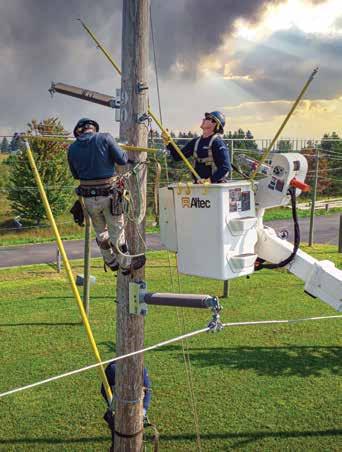
“Electric co-ops were founded on the idea that we’re stronger together. Every pole we set, every line we run, every investment we make—it all comes back to serving people, not profits.”
Michigan co-ops are not alone. We’re part of a national network of 942 electric cooperatives serving more than 42 million people across 56% of the landmass of the United States. That shared strength gives us access to resources, knowledge, and collaboration that help us better serve our nationwide communities—while still maintaining local control.
Does the thought of another winter with your old furnace make you—or your wallet—shiver? Advances in technology have made heat pumps an increasingly popular efficient HVAC option, even in cold climates like Michigan.
Not familiar with heat pump technology? Heat pumps do exactly what the name suggests—pump heat. Unlike furnaces, which use electricity to generate heat, heat pumps transfer heat that already exists in the air. In the winter, heat is moved from outside your home to the inside, while in the summer, the opposite occurs (yes, heat pumps can provide air conditioning, too!). This method of temperature control makes heat pumps an efficient alternative to traditional HVAC systems. In fact, an air-source heat pump can reduce your electricity use by 50% compared to baseboard heaters and furnaces. A significant reduction in electricity use can lead to significant savings on your electric bill. Depending on the size and energy efficiency of your home, savings can average over $500 annually. And that doesn’t take into account rebates available from HomeWorks!
Energy Optimization Program Rebates HomeWorks members can take advantage of Energy Optimization rebates to reduce the upfront cost of making the switch to a heat pump in their home. Rebates start


at $1,000 for qualifying residential air-source heat pump systems and $1,500 for qualifying ground-source systems.
Looking to upgrade your business’s HVAC system? Commercial heat pump rebates are available, too! See the 2025 Business Non-Lighting Application at HomeWorks.org/EO to learn more about your options.
Find all rebate details, applications, and more ways to save through the HomeWorks Energy Optimization program at homeworks.org/eo, or call 877-296-4319 with questions.
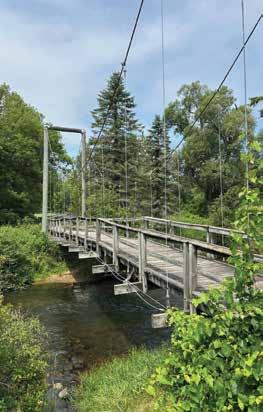


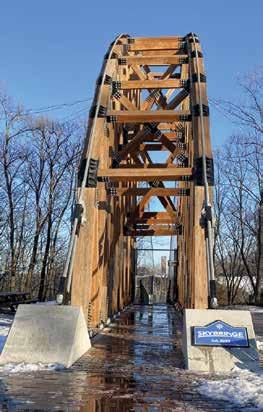
1. MOST VOTES “Little Mac” pedestrian bridge in Reed City, Michigan, is a 150-foot replica of the Mackinac Bridge. This suspension bridge moves and sways quite a bit while crossing over it, but it’s well worth it to get to the wild raspberry patch on the other side. Casie Bayless, Portland
2. The Blue Water Bridge in Port Huron is a great place to watch the big ships go by! Debra Cook, Mt. Pleasant
3. Rivet by rivet. Heather Balcom, Shepherd
4. SkyBridge in Boyne Falls is a fabulous adventure! Glenda Adams, Evart
Enter to win a $100 energy bill credit!
Submit your “Seasonal Beauty” photos by Oct. 25 for the January 2026 issue! Each month, HomeWorks members are able to submit photos on our website for our photo contest. The photo receiving the most votes is published here, along with some other selections from that month.
To enter the contest, visit HomeWorks.org/ photocontest . Enter your picture, cast your vote, and encourage others to vote for you, too. If your photo is published in Country Lines during 2026, you will be entered into a drawing for a chance to win one of four $100 credits on your December 2026 HomeWorks bill!

RECIPE CONTEST Win a $100 energy bill credit!
Cozy Bowls, due Nov. 1. Submit your favorite recipe for a chance to win a $100 bill credit and have your recipe featured in Country Lines with a photo and a video. Submit your recipe at micoopkitchen.com, or send it via email (include your full name and co-op) to recipes@countrylines.com.
MUFFINS WITH MAPLE CREAM
Phil Ehardt, Great Lakes Energy
MUFFINS:
3 large eggs
1 (15-ounce) can pumpkin puree/canned pumpkin
½ cup neutral flavored oil, like canola, vegetable, avocado
½ cup unsweetened applesauce
1 cup granulated sugar
2½ cups all-purpose fl our
2 teaspoons pumpkin pie spice
1 teaspoon baking soda
½ teaspoon baking powder
½ teaspoon salt
GLAZE:
1 cup powdered sugar
2–4 tablespoons heavy cream
½ teaspoon maple extract
Preheat the oven to 375 F. Line two standard muffi n tins with paper liners and set aside (24 muffi ns total). In a large bowl, whisk together the eggs, pumpkin, oil, applesauce, and sugar.
In a separate bowl, stir together the fl our, pumpkin pie spice, baking soda, baking powder, and salt. Add the dry ingredients to the wet ingredients and mix until just combined (don’t overmix or the muffi ns may be dense/heavy). Divide the batter evenly among the prepared muffi n tins, filling the cups about ⅔ full (or slightly more). You can use a cookie scoop to portion the batter into the muffi n tin. Bake for 15–20 minutes until the top of the muffi ns spring back to the touch and/or a toothpick inserted in the center of a muffi n comes out clean or with a few moist crumbs attached. Remove the muffi ns from the muffi n tin to a cooling rack to cool completely. For the glaze, whisk together the glaze ingredients, starting with the lesser amount of heavy cream and adding more as needed to make a pourable, but still thick, glaze. Drizzle the glaze over the cooled muffi ns with a spoon or fork and serve.
Watch a video of this month’s winning recipe at micoopkitchen.com/videos




Karla Oosting, Great Lakes Energy
2 pounds boneless, skinless chicken breasts
16 ounces Olive Garden Signature Italian Dressing (or favorite Italian dressing)
½ cup shredded Italian cheese
¼ teaspoon black pepper
8 ounces cream cheese
16 ounces penne pasta
½ cup Parmesan cheese
Add chicken breasts to slow cooker. Pour in the Italian dressing and sprinkle with cheese and black pepper. Place cream cheese on top. Cover. Cook on high for 4 hours or low for 5–6 hours. About 10–15 minutes before the cooking time is done, start cooking the pasta according to the package directions; drain well. Shred the chicken with 2 forks. Then add the pasta to the slow cooker and stir. Sprinkle with Parmesan cheese. Enjoy!
Mary Ellen Wynes, HomeWorks Tri-County
1 ready-made pie crust
1 teaspoon fl our
½ cup sugar
1 teaspoon cinnamon
½ teaspoon salt
¼ teaspoon ground cloves
1 (16-ounce) can (2 cups) pure pumpkin puree
1 (5-ounce) can evaporated milk
2 eggs, beaten
1 (8-ounce) container whipped topping, divided
½ cup chopped pecans
½ cup sour cream
Preheat oven to 425 F. Prepare pie crust according to package directions. In a large bowl, combine fl our, sugar, cinnamon, salt, cloves, pumpkin, evaporated milk, and eggs. Mix well. Fold in 1½ cups whipped cream (reserve remaining for topping) and pecans; stir. Pour into crust. Bake for 15 minutes. Reduce the oven temperature to 350 F and continue baking for 40–45 minutes or until a knife inserted in the center comes out clean. Cool. In a small bowl, fold the sour cream into remaining whipped topping. Dollop on the cooled pie.
Gary Geyer, Presque Isle Gas & Electric
3 pounds ground chuck
2 (14-ounce) cans kidney beans, liquid reserved
2 (14-ounce) cans pinto beans, liquid reserved
2 (14-ounce) cans black beans, liquid reserved
2 medium onions, diced
2 green bell peppers, diced
1 bunch celery, thinly sliced
2 (4-ounce) cans diced green chilies
1 (28-ounce) can diced tomatoes
1 (14-ounce) can diced tomatoes, chili ready
2 cups water
2 (14½-ounce) cans tomato sauce
3 tablespoons chili powder + 1 teaspoon chili powder, divided
1 tablespoon freshly ground black pepper
1 tablespoon garlic powder
2 tablespoons cumin
½ teaspoon seasoning salt
1–2 sliced jalapeños (for spicier chili)
• Optional toppings: shredded cheese, diced green onions, fi nely diced onions, crackers, sour cream
In a large pot, cook the ground chuck until no longer pink. Drain excess fat. Add only the liquid from the cans of beans (setting the beans aside). Then add the onions, peppers, celery, green chilies, diced tomatoes, water, tomato sauce, chili powder, pepper, garlic, cumin, seasoning salt, and jalapeños (if desired). Stir and cook on high for 20 minutes, stirring often. Then reduce to a simmer for 2 hours while stirring occasionally to prevent sticking/burning. After 2 hours of simmering and stirring, stir in all the beans. If too thick, add small amounts of water and simmer another 10–15 minutes. Serve with optional toppings, if desired.
Your Power Was Over 99.95% Reliable Again Over The Past Year!
We are proud to provide you with superior electric reliability, and we are able to do so in large par t thanks to the investment we make into carefully maintaining and upgrading our system to prevent outages before they occur. The fixed costs of maintaining a reliable electric system continue to rise due to persistent inflationary pressures, but here at your Co-op, we continue to work ha d every day to ensu great value for you and
•Metered service & auto-fill options
• Capped winter rates, no hidden fees
•Convenient payment options

• Qualified new customers: Use promo code HEATING25 upon sign-up to receive a free patio heater!

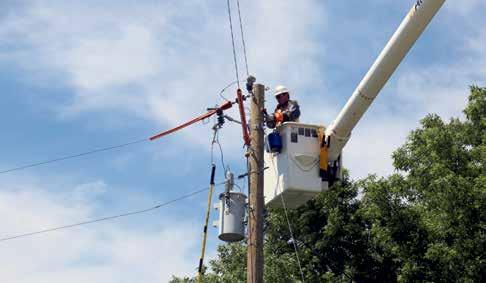
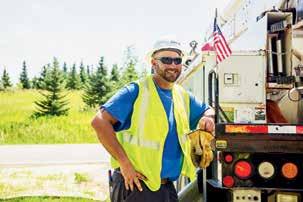

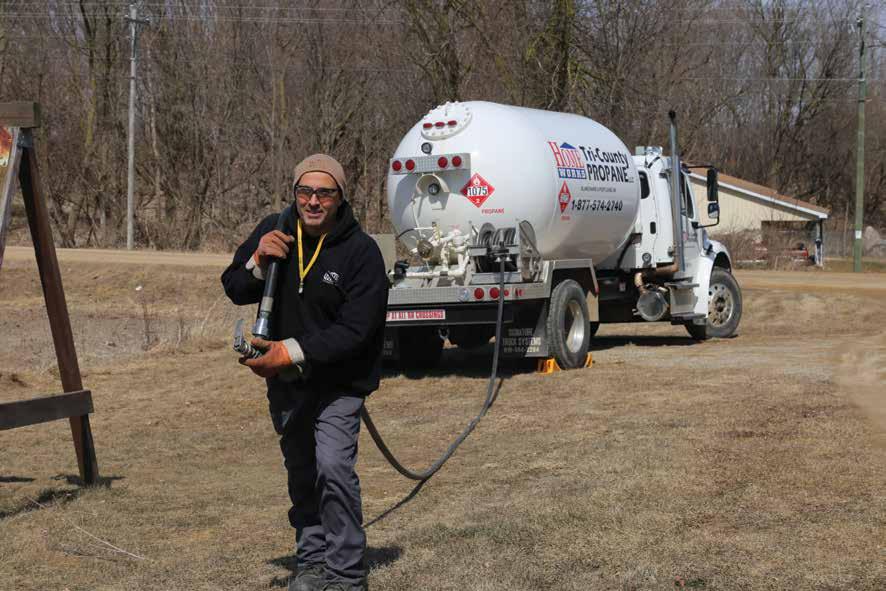


Meeting in Portland on Aug. 25, your board of directors:
• Reviewed the results of the Cooperative’s recent thirdparty cost of service study provided by the Cooperative Finance Corporation.
• Reviewed the Michigan Electric Cooperative Association’s plan for a proposed collective Energy Optimization program to help HomeWorks and other state electric co-ops meet Michigan’s new energy waste reduction mandate, which takes effect in January 2026.
• Unanimously approved the renewal of the Co-op’s all-requirements power supply contract with Wolverine Power Cooperative.
• Reappointed Directors John Lord and Shirley Sprague to the board audit committee, Directors Shirley Sprague and Jim Stebbins to the board policy committee, and Directors Jake Borton, Luke Pohl, and Theresa Sopocy to the board redistricting committee for the next one-year term.
• Appointed Director Theresa Sopocy to represent HomeWorks on the Spartan Renewable Energy board of directors.
• Discussed and accepted Board Policy 104 –Committees of the Board of Directors, as revised.
• Learned there were 141 new members in July.
• Acknowledged the July safety report, listing employee training as well as minor employee and public incidents involving electric, propane, or fiber optic.
• Acknowledged the July physical & cybersecurity report, noting that there were no major security breaches or incidents to report for the month.
The first 15 minutes of every board meeting are available for members who wish to address the board of directors on any subject. The next meetings are scheduled for 9 a.m. on Oct. 27 at Blanchard and 9 a.m. on Nov. 24 at Portland.
Members who wish to have items considered on the board agenda should call 517-647-7554 at least a week in advance of the meeting.
More than 200 HomeWorks delegates, along with their guests, logged on to attend the Co-op’s 88th Annual Meeting of Delegates, which was held virtually via Zoom Webinar on Aug. 16. The meeting included a business meeting, an in-depth review of the Co-op’s 2024 financials, a Co-op operations update, a video highlighting this year’s Electric Cooperative Youth Tour, and exciting prize giveaways.
The purpose of the Annual Meeting of Delegates is for the delegates elected to represent each HomeWorks district to come together to collectively review the annual report of the Co-op, vote on any matters of importance to the membership, and present to the board any matters brought forth for further discussion at the district meetings in May.
At a brief reorganizational board meeting held after this year’s Annual Meeting, 2025 director electees John Lord (District 1), Theresa Sopocy (District 5), and Shirley Sprague (District 7) were officially seated. At the reorganizational meeting, the board also re-elected the following slate of board officers: Chairman Luke Pohl, Vice Chair John Lord, and Secretary/Treasurer Shirley Sprague.

If you missed this year’s Annual Meeting, you can watch a recording of the event at HomeWorks.org/ annualmeeting . If you are interested in attending next year’s Annual Meeting, be sure to sign up as a delegate during the registration process for your 2026 virtual district meeting in May.

By Emily Haines Lloyd
Before the trophies and roaring Munn Ice Arena crowds, Adam Nightingale’s hockey world was a frozen pond in Cheboygan, Michigan. Skates laced tight, cheeks stung red by the winter air, he and his brothers battled for bragging rights. It was there, on that rough northern ice, that he learned lessons he still carries as Michigan State University’s head coach—chief among them, that “hockey is what you do, it’s not who you are.”
In Cheboygan, effort mattered more than accolades, and how you treated people mattered most of all. Today, Nightingale blends that smalltown humility with championship-level ambition, shaping both a winning program and the young men who play for it.
Sports were a family affair. Nightingale’s parents, both athletes themselves, raised their children with competitive spirits, and sports were a part of everyday life. So much so, all three Nightingale brothers have found their way to careers in sports—specifically, hockey. Adam’s older brother, Jason, is the Buffalo Sabres’ assistant director of
amateur scouting, and his younger brother, Jared, played professionally for nearly 10 years and now coaches for the Rockford IceHogs, an affiliate team for the Chicago Blackhawks. But for the Nightingale boys, the focus was never really about reaching the pros. “We were definitely competitive kids,” said Nightingale. “But our parents emphasized doing our best, treating people right, and finding what we were passionate about.”
Nightingale followed his passion for hockey to Lake Superior State University before transferring to Michigan State University for two years.
Wearing the Spartan jersey was more than an athletic milestone; it was almost prophetic. Years later, returning as head coach at MSU was a fullcircle moment.
Nightingale was hired in 2022, inheriting a hockey program that had won only 12 games the previous season.
In just his second season as head coach, Nightingale guided MSU to both the Big Ten

regular-season and tournament championships— the fi rst time in program history that the team captured both titles in the same year. He also earned 2024 Big Ten Coach of the Year honors. Still, he’s quick to share the credit. “We’ve got great players, great staff, great people. Championships are a team effort,” he said.
Coaching wasn’t part of a grand plan. After graduating from college and four seasons in the minors, with his fi rst child on the way, Nightingale left the game for a job with a construction company to secure health insurance. But the pull of the rink never faded.
He began teaching economics and coaching hockey at a boarding school, where he discovered the deep satisfaction of mentoring young athletes.
“Coaching is about relationships,” said Nightingale. “I’ve been the guy on the power play, and I’ve been the guy not on the ice when we’re one goal down. Part of coaching is getting your players to see the value of every role.”
Nightingale’s approach to coaching is steeped in the values of rural Michigan—humility, resilience, and community. “There’s a humility in northern Michigan,” he said. “It’s never about your job title or money. It’s about how you treat people.”
Growing up in a small town also meant accountability. “If you want something, you have to work for it,” he said. “There’s a little bit of a chip on your shoulder. Which I think can be a positive thing for an athlete.”
That mentality resonates with his current Spartan players, fostering a culture of competitiveness and continuous improvement. “When something doesn’t go our way, we fi gure out why and get better,” he said.
Now, behind the bench at Munn Ice Arena, Nightingale carries both the tradition of Spartan hockey and the lessons learned on Cheboygan ice.
When the noise of the season fades and the ice lies quiet again, it’s easy to see how that boy from Cheboygan grew into a coach who still plays for all the right reasons.
“Being here,” Nightingale said, “just feels like right.”

I’ve been the guy on the power play, and I’ve been the guy not on the ice when we’re one goal down. Part of coaching is getting your players to see the value of every role.” “

It’s time to apply for our 2025-26 classroom grants and college scholarships!
We offer grants of up to $2,000 to help teachers in our service area provide S.T.E.A.M. (Science, Technology, Engineering, Arts, and Math) education in their classrooms.
Applications due Nov. 14
Current high school seniors living on our electric lines could be eligible for one of our one-time $2,500 scholarships to help with 2025-26 college expenses!
Applications due March 13

For more info or to apply, click the Outreach tab at: HomeWorks.org

This hunting season, we encourage all members to be aware of electrical equipment and take necessary precautions while hunting. Keep these safety tips in mind as you enjoy the great outdoors.
1
2
Take notice of posted warning signs and keep clear of electrical equipment.
Do not shoot at or near power lines or insulators.
4
Be especially careful in wooded areas where power lines may not be as visible.
5
3
Know where power lines and equipment are located on the land where you hunt.
6
Do not place deer stands on utility poles or climb poles. Energized lines and equipment can conduct electricity to anyone who comes in contact with them, causing shock or electrocution.
Do not place decoys on power lines or other utility equipment. Any nonelectrical equipment attached to a pole can pose an obstruction and serious hazard to our line crews.

By Catherine Drager, a HomeWorks Tri-County Electric Cooperative member
I was driving past a garage sale one day and spotted an old dresser in the driveway. Short on time, I didn’t stop. I asked my husband Marvin to check it out the next day to see if it was something I could refi nish for the grandchildren’s bedroom. He stopped at the garage sale but came home and told me that he bought a truck. Puzzled, I said to him that I didn’t see a truck for sale there, and he told me the owner had a 1940 Dodge truck, all in pieces, in the garage and on the rafters, that he never got around to putting together and restoring.
Needless to say, those pieces came home with him. He worked on it in his spare time, between running his business and visiting our cabin in Farwell. He dedicated more time to it once our son was getting married at the Packard Proving Grounds in Shelby
Township in May of 2016. You could have one of their classic Packard cars to display at the reception, or bring in your own classic vehicle. The Dodge wasn’t completed at that point, but we were happy to use our late brother-inlaw’s 1930 Model A for the wedding.
The truck was completed shortly after, and my husband enjoyed taking it to the Downriver and Woodward Dream Cruises and car shows, and driving it around town. He even put a lap belt in it for me so that I didn’t bounce around on the bench seat. Many family members and friends enjoyed rides in the truck, and he loved sharing the stories of searching for the parts and the challenge of putting it all together. Marvin passed in 2021, but I am grateful he never checked out that old dresser, but was able to enjoy his best garage sale “fi nd.”
“Many family members and friends enjoyed rides in the truck, and he loved sharing the stories of searching for the parts and the challenge of putting it all together.”
GUEST COLUMN Win $200 for stories published! Share your fondest memories and stories. Win $200 for stories published. Visit countrylines.com/community to submit.



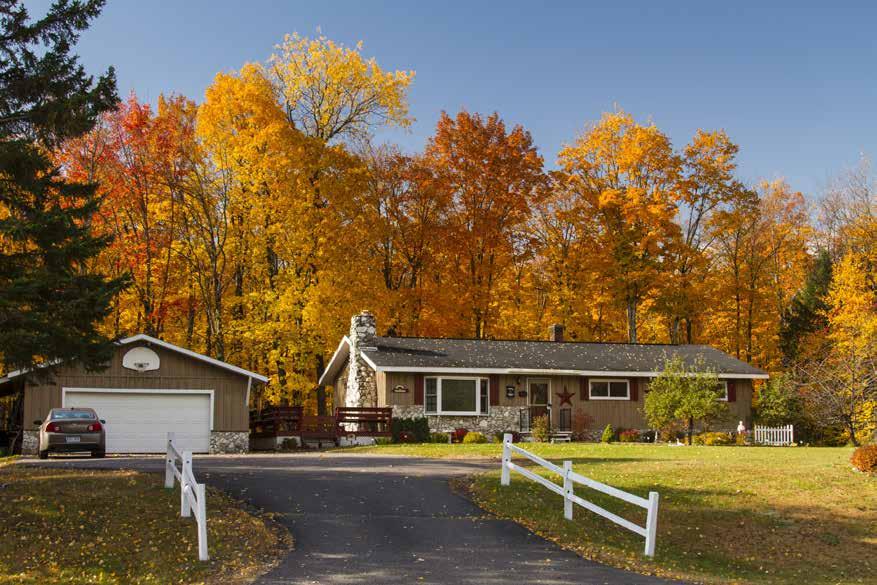



HomeWorks.org facebook.com/homeworks.org homeworks.org facebook.com/homeworks.org
Report Outages: 1-800-848-9333

